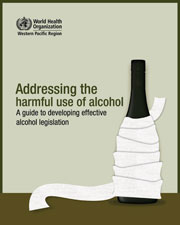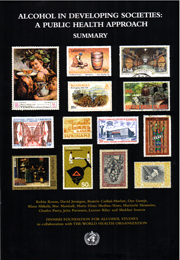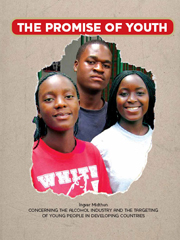
Home > Intergovernmental institutions > World Health Organization > World Health Assembly set to discuss alcohol

World Health Assembly set to discuss alcohol
The Health ministers from all over the world will discuss the health burden of alcohol in the forthcoming World Health Assembly to be held in Geneva 14-23 May. This is the follow up of the WHA resolution 58.26 Public health problems caused by harmful use of alcohol, from 2005, the first WHA resolution exclusively on alcohol since 1983. The documents for the alcohol issue are now available on the WHO site.
2007-04-25
The World Health Assembly will discuss the technical issue of Evidence-based strategies and interventions to reduce alcohol-related harm (Agenda item 12.7). Since the resolution “58.26 Public health problems caused by harmful use of alcohol” 2005 WHO has been working on the request in the resolution, to report to the Sixtieth World Health Assembly on progress made in implementation of the resolution. Since 2005 WHO has held consultations both with the commercial industries and with NGOs on the issue. A stakeholder’s meeting was held in Geneva and the WHO Expert Committee met in October 2006. The report from the Expert Committee will be tabled at the WHO Executive board meeting to be held after the WHA.
Among NGOs around the world concerned by the rising public health problems caused by alcohol, there are now great expectations that WHO will continue to address these issues in the years to come.
Message is clear
The report by the secretariat is now available at the WHO site. It points out that from a public-health perspective, the message is clear: efforts must be directed towards culturally appropriate and cost-effective interventions that reduce harmful use of alcohol. The report also points out that The interaction between all these individual and social factors implies the need for comprehensive policy measures to reduce alcohol-related harm, not just for the drinkers but also to protect those individuals and groups who are at risk of being negatively affected by others’ drinking.
Harmful use of alcohol causes considerable public-health problems and is, according to the report, ranked as the fifth leading risk factor for premature death and disability in the world. The report also goes on to point out that the current estimates of alcohol-attributable disease burden only partly describe the impact of harmful use of alcohol on society. It refers to accumulating evidence which suggests an association between alcohol and infectious diseases like HIV disease and tuberculosis, but such links have to be proven and quantified before global estimates of burden of disease can be adjusted accordingly. In addition, harmful use of alcohol causes diverse social and economic damage and costs, most of which are not reflected in the alcohol-attributable component of the estimates.
Combining strategies
The resolution WHA58.26, also requested, without giving a time limit, the Director-General to draw up recommendations for effective policies and interventions to reduce alcohol-related harm. The report refers to substantive evidence that policies and programmes should use an appropriate combination
of the following strategies: regulating the marketing of alcoholic beverages, (in particular those practices that influence younger people); regulating and restricting their availability; enactment of appropriate drink-driving policies; reducing the demand for alcohol through taxation and pricing mechanisms; raising awareness and support for policies; providing easily accessible and affordable treatment services for people with alcohol-use disorders; and implementing widely screening programmes and brief interventions against hazardous and harmful use of alcohol.
More information:
WHA resolution 58.26 Public health problems caused by harmful use of alcohol (pdf from WHO site)
WHA documents:
A60/14 (pdf rfrm the WHO site)
Evidence-based strategies and interventions to reduce alcohol-related harm
Evidence-based strategies and interventions to reduce alcohol-related harm
A60/14 Add.1 (pdf from the WHO site)
Evidence-based strategies and interventions to reduce alcohol-related harm; Global assessment of public-health problems caused by harmful use of alcohol
Evidence-based strategies and interventions to reduce alcohol-related harm; Global assessment of public-health problems caused by harmful use of alcohol
EB121/10 (pdf from the WHO site)
Expert committees and study groups.
This document contains the WHO Expert Committee On Problems Related To Alcohol Consumption, Second report, Geneva, 10–13 October 2006. Part of the document
Expert committees and study groups.
This document contains the WHO Expert Committee On Problems Related To Alcohol Consumption, Second report, Geneva, 10–13 October 2006. Part of the document
![]()
![]()
Developed with CustomPublish CMS by Nettinfo AS




